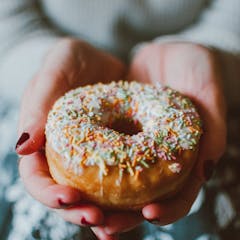
Articles on Dopamine
Displaying 1 - 20 of 60 articles

A lack of dopamine seems to directly cause social problems.

Although the link between sugar and hyperactivity is murky, there is a proven link between the neurotransmitter dopamine and increased activity.

Alcohol is responsible for more deaths than overdoses from opioids and all other substances combined, yet less than 10% of people with alcohol use disorder receive treatment.

We all want to eat healthily, especially as we reset our health goals at the start of a new year. But sometimes these plans are sabotaged by powerful cravings for sweet, salty or carb-heavy foods.

The world’s largest online dating company – which runs Tinder, Hinge, OkCupid, The League and more – is being sued for making its apps too addictive. Are we swiping right into a trap?

Exercising and socialising with friends may be the best kinds of activities to put on your ‘dopamine menu’.

Music therapy has been shown to help people suffering with cancer, chronic pain and depression. Our research is testing which parts of the brain are affected by different kinds of music

From dopamine hacking to dopamine detoxes, some people have sought to harness this brain chemical to improve their mood and productivity. But it’s far more complicated than that.

Experts examine the five questions they commonly hear from women and girls about their hormones and ADHD symptoms.

Are holidays really necessary, and why do we need them? And, above all, what are the benefits of a few days off? This is what science says.

For those who need it, Adderall and other stimulants can be game-changing medications that help restore the chemical imbalances underlying ADHD. But for those who don’t, these drugs can be harmful.

Patients who undergo transcranial magnetic stimulation say it’s painless, with few to no side effects. The treatment isn’t yet widely accessible, but for those who use it, the effects can be profound.

Studies suggest that marijuana and CBD use might help relieve chronic pain while also reducing a patient’s need for opioids.

Binge eating or hyperfixating on certain foods may be common in people with ADHD.

There is evidence to suggest that dopamine plays a key role in gamling addiction.

Plus, how a team of musicologists and computer scientists completed Beethoven’s unfinished 10th Symphony using AI. Listen to The Conversation Weekly podcast.

Mouse brains produce random, strong bursts of dopamine and are able to control them. This may challenge many long-held ideas about learning and motivation.

The negative effects are likely caused by the same mechanisms behind why sugar makes us feel so good.

Drugs which act through the brain chemical dopamine may one day help restore consciousness in people who have lost it.

When dealing with a difficult event, such as the current pandemic, the electrical current that governs our brains is altered, affecting behaviour and mood.
